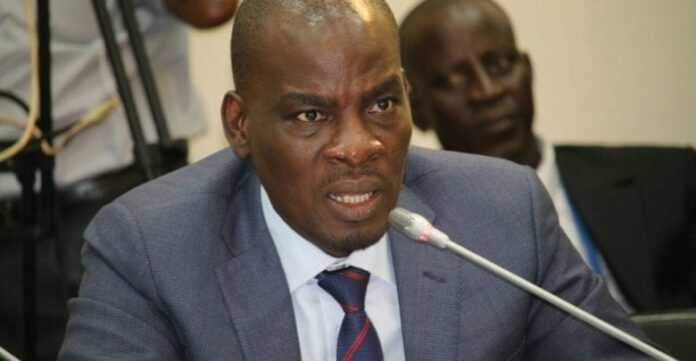The Minority Leader, Haruna Iddrisu, has said that his side in Parliament will not support the controversial E-levy policy proposal in the 2022 budget statement.
According to him, the levy serves as a disincentive for the growth of digital economy.
Speaking at a post-budget workshop in Ho on Saturday November 20, he said “Mr Speaker, understandably, we see that the Minister of Finance seeks to introduce some measures including the now popularly declared e-levy or digital levy as some have quite named it.
“Mr Speaker, our concern is whether the e-levy itself is not and will not be a disincentive to the growth of digital economy in our country. We are convinced that the e-levy may as well even be a disincentive to investment and a disincentive to private sector development in our country. We in the minority may not and will not support government with the introduction of that particular e-levy . We are unable to build national consensus on that particular matter.”
The introduction of the levy attracted concerns among a section of Ghanaians.
For example, the National Communications Officer of the National Democratic Congress (NDC), Sammy Gyamfi said on the Key Points on TV3 Saturday November 20 that the government was punishing Ghanaians for their own recklessness following the introduction of these taxes.
“They are punishing Ghanaians for their on recklessness,” Sammy said among other things.
Also speaking on the same show, a Fiscal Policy Specialist at Oxfam, Dr Alex Ampaabeng said the minority MPs should be blamed if this disapproved.
He explained that approval of the 2022 budget statement which was presented to Parliament by the Finance Minister Ken Ofori Atta on Wednesday November 17, will require the support of lawmakers from both sides of the house to do so.
Therefore, if the tax on mobile money transaction (E-levy), is approved by Parliament, the National Democratic Congress Members of Parliament should also be held liable, not only those on the government’s side.
“That is the first point that I want to make,” he said.
He further stated that the tax is going to counter the government’s agenda of ensuring a cashless stem because people will now resort to relying on cash transactions.
Due to the hue and cry over this policy proposal, Energy Minister Dr Mathew Opoku said a lot of education is required on the e-levy that has been introduced in the 2022 budget statement.
Speaking on the New Day show on TV3 he said the levy affects specific transactions, not all.
“The implementation is going to come with education, not everything that is affected. For example less than hundred cedis transaction is not affected. There is a lot of education that needs to be done,” the Manhyia South MP told TV3’s Johnnie Hughes on Thursday November 18.
His colleague lawmaker for Ningo Prampram, Samuel Nartey George for his part, said the government did not engage the telecom companies before announcing the introduction of the tax on mobile money services in the 2022 budget statement.
“Let me state for the records that the government has not engaged any of the service providers in the telecoms space on how the draconian ‘digital tax’ would be implemented. How do you announce a tax when those to implement it & be affected by it are left in the dark? Clueless bunch,” he said in a tweet.
He added “The NCA and the Ministry of Communications are now inviting Telcos and Service providers in the space to a meeting on Friday to discuss implementation of a policy announced in the budget? Such a clueless bunch of managers. Post facto thinking.”
Finance Minister Ken Ofori-Atta announced a new levy to be charged by government in 2022 on all electronic transactions to widen the tax net and rope in the informal sector.
“It is becoming clear there exists enormous potential to increase tax revenues by bringing into the tax bracket, transactions that could be best defined as being undertaken in the ‘informal economy’,” Mr Ofori-Atta observed on Wednesday, November 17 as he presented the 2022 budget statement in Parliament.
“After considerable deliberations, government has decided to place a levy on all electronic transactions to widen the tax net and rope in the informal sector. This shall be known as the ‘Electronic Transaction Levy or E-Levy’.”
He explained that the new E-levy will be a 1.75 per cent charge on all electronic transactions covering mobile money payments, bank transfers, merchant payments and inward remittances to be borne by the sender except inward remittances, which will be borne by the recipient.
This will, however, not affect transactions that add up to GH¢100 pr less per day.
“A portion of the proceeds from the E-Levy will be used to support entrepreneurship, youth employment, cyber security, digital and road infrastructure among others.”
This new levy is scheduled to start Saturday, January 1, 2022.
In 2020, total value of transactions was estimated to be over GH¢500 million with mobile money subscribers and users growing by 16 percent in 2019.
According to a Bank of Ghana report, Ghana saw an increase of over 120 percent in the value of digital transactions between February 2020 and February 2021 compared to 44 percent for the period February 2019 to February 2020 due to the convenience they offer.
This was definitely heightened by the advent of Covid-19 especially during the lockdown.
By Laud Nartey|3news.com|Ghana


